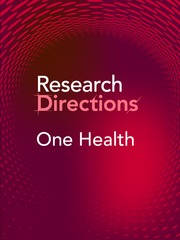Context
The looming challenges of pandemic recovery, climate change emergencies, species extinction, and growing food insecurity are driving calls for more One Health to “do more.” To address these calls, it is reasonable to anticipate an explosion in One Health training programs. Many One Health educational efforts were originally designed in response to emerging zoonotic diseases. As the scope of practice of One Health grows, the breadth of knowledge, skills, and attitudes to be cultivated through education and training also grows. Many One Health programs created in the early days of One Health could not benefit from the experiences of years of applying One Health in practice that exist today. Few One Health programs have been systematically evaluated to see if or how their structure or curriculum empowers learners to be effective One Health researchers or practitioners. We invite authors to provide evidence-based assessments of the impacts of different means, methods, and targets for training and/or systematic assessments of educational theory to help answer the Question, “is there an ideal curriculum and pedagogy to achieve an optimal One Health practitioner capable of contributing to the growing expectations for One Health?”
How to contribute to this Question
If you believe you can contribute to answering this Question with your research outputs, find out how to submit in the Instructions for authors (https://www.cambridge.org/core/journals/research-directions-one-health/information/author-instructions). This journal publishes Results, Analyses, Impact papers, and additional content such as preprints and “gray literature.” Questions will be closed when the editors agree that enough has been published to answer the Question, so before submitting check if this is still an active Question. If it is closed, another relevant Question may be currently open, so do review all the open Questions in your field. For any further queries, check the information pages (https://www.cambridge.org/core/journals/research-directions-one-health/information/about-this-journal) or contact this email ([email protected]).
Competing interests
The author(s) declare none.




